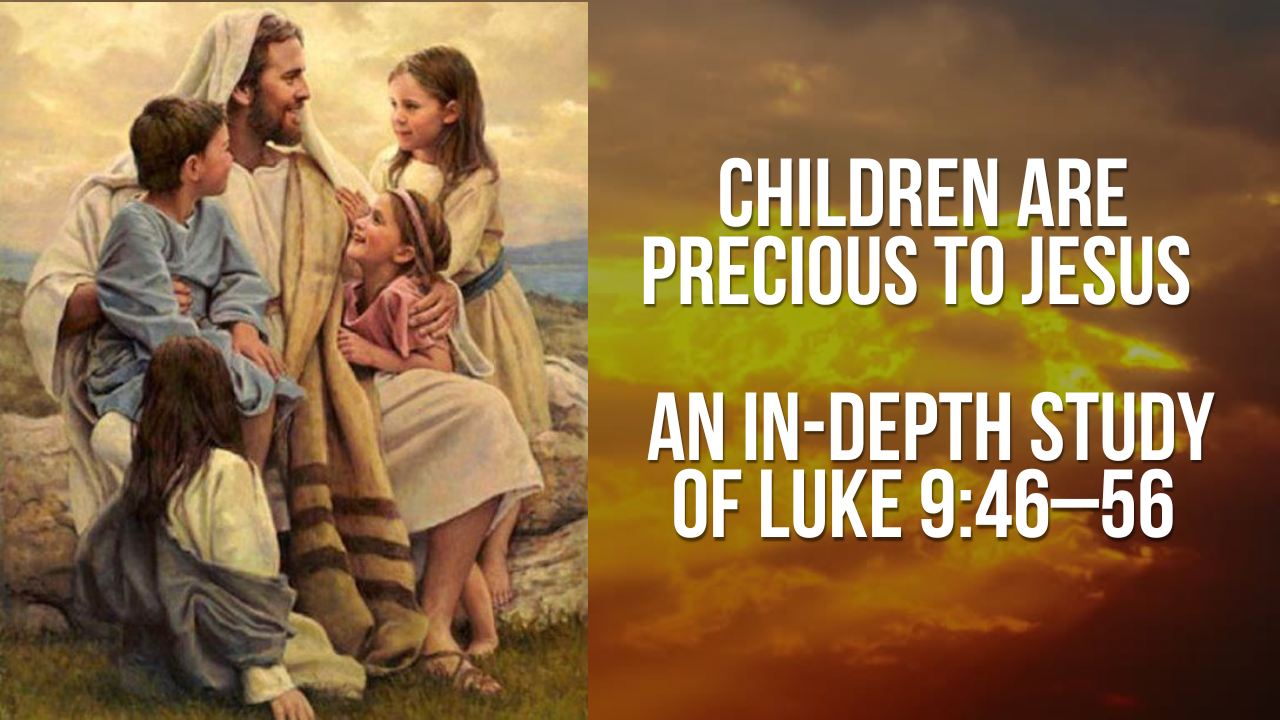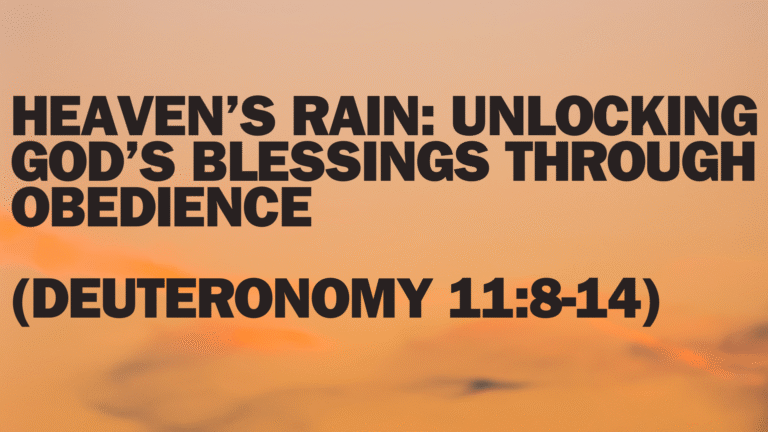Children Are Precious to Jesus An In-Depth Study of Luke 9:46–56
Introduction
Throughout the Gospels, Jesus consistently reveals the values of God’s kingdom in ways that challenge human pride, social status, and cultural norms. One of the most profound teachings is His love for and exaltation of children. In Luke 9:46–56, two significant themes are brought together: the disciples’ dispute over greatness and their misunderstanding of true discipleship in relation to humility, service, and compassion. In this passage, Jesus emphasizes that children are precious in God’s eyes, while also showing how childlike humility is the posture required for His followers.
This article will examine Luke 9:46–56 in detail, drawing out its theological truths, practical applications, and spiritual encouragement. We will see how Jesus redefines greatness, why children matter so much in God’s kingdom, and how believers today can live out this message.
The Passage: Luke 9:46–56 (NLT)
46 Then his disciples began arguing about which of them was the greatest.
47 But Jesus knew their thoughts, so he brought a little child to his side.
48 Then he said to them, “Anyone who welcomes a little child like this on my behalf welcomes me, and anyone who welcomes me also welcomes my Father who sent me. Whoever is the least among you is the greatest.”
49 John said to Jesus, “Master, we saw someone using your name to cast out demons, but we told him to stop because he isn’t in our group.”
50 But Jesus said, “Don’t stop him! Anyone who is not against you is for you.”
51 As the time drew near for him to ascend to heaven, Jesus resolutely set out for Jerusalem.
52 He sent messengers ahead to a Samaritan village to prepare for his arrival.
53 But the people of the village did not welcome Jesus because he was on his way to Jerusalem.
54 When James and John saw this, they said to Jesus, “Lord, should we call down fire from heaven to burn them up?”
55 But Jesus turned and rebuked them.
56 So they went on to another village.
1. The Disciples’ Argument About Greatness (vv. 46–48)
The passage begins with the disciples arguing about who among them is the greatest. This is a striking contrast to what had just happened earlier in the chapter. Jesus had healed the demon-possessed boy (Luke 9:37–43) and predicted His coming suffering (Luke 9:44–45). Instead of meditating on His mission of humility and sacrifice, the disciples are preoccupied with rank and position.
Jesus responds not with anger, but with a teaching moment. He brings a child and places the child beside Him. In the culture of that time, children had no social standing, no power, and no authority. They were the least in society. By using the child as an illustration, Jesus flips the worldly concept of greatness upside down.
Key Truths:
-
Greatness in God’s kingdom is measured by humility, not power.
-
Welcoming the least is equivalent to welcoming Christ Himself.
-
Children represent the kind of dependent faith God desires.
2. Welcoming Children Equals Welcoming God (v. 48)
Jesus takes it a step further. To welcome a child in His name is not just an act of kindness—it is welcoming Him, and by extension, welcoming the Father.
This is a staggering statement. In a society where children were overlooked, Jesus elevates their worth to a divine level. He identifies Himself with the powerless and vulnerable, showing that God’s heart is especially tender toward them.
Implications for Today:
-
Children are not distractions in the kingdom—they are central to it. Churches and families must treat them with dignity, protection, and care.
-
Serving the vulnerable is serving Christ. Whether it’s children, the poor, or the marginalized, our treatment of them reflects our treatment of God.
3. The Rebuke of Sectarian Attitudes (vv. 49–50)
Immediately after the teaching on children, John raises a concern about someone outside their group casting out demons in Jesus’ name. The disciples were protective of their status, thinking they had exclusive rights to ministry.
But Jesus rebukes this narrow thinking: “Don’t stop him! Anyone who is not against you is for you.”
This teaching is deeply connected to the child illustration. Just as greatness is not about status, ministry is not about exclusivity. God’s work is bigger than one group, and humility means celebrating the work of others, even if they don’t belong to “our circle.”
Application:
-
We must avoid the pride of thinking only our denomination, church, or group has God’s blessing.
-
Kingdom greatness is found in collaboration, not competition.
4. Jesus’ Journey Toward Jerusalem (vv. 51–56)
Luke notes that Jesus “resolutely set out for Jerusalem” (v. 51). This signals His intentional march toward the cross. Every teaching in this section must be understood in the shadow of His coming sacrifice.
When a Samaritan village rejects Him, James and John react in anger, wanting to call down fire. But Jesus rebukes them. His mission is not destruction but salvation.
Lessons Here:
-
The disciples were still thinking in terms of power, revenge, and judgment. Jesus demonstrates that true greatness lies in patience, mercy, and love.
-
Childlike humility includes the willingness to endure rejection without retaliating.
5. Why Children Are Precious to Jesus
This passage, combined with others (e.g., Matthew 18:1–6; Mark 10:13–16), highlights Jesus’ deep love for children. Why are children so precious to Him?
-
They embody humility and dependence.
Children know they cannot survive on their own. Spiritually, this mirrors the kind of dependence we must have on God. -
They represent purity of faith.
Children often believe without overcomplicating. Their trust is sincere and unpretentious. -
They symbolize the vulnerable whom God protects.
Throughout Scripture, God defends the weak, and children represent this group in its purest form. -
They reflect God’s design for generational blessing.
God’s covenant is always forward-looking, with promises extending to children and future generations.
6. Modern Applications
a) Parenting and Family Life
Christian parents are called to raise their children in the fear and knowledge of the Lord (Ephesians 6:4). Jesus’ words remind us that children are not burdens but blessings entrusted to us.
b) Church Ministry
Churches must prioritize children’s ministry. The way a church treats its youngest members reveals its spiritual health. Welcoming children means making space for them in worship, discipleship, and service.
c) Society and Justice
Globally, many children suffer due to poverty, abuse, neglect, and violence. If Jesus so highly valued children, His followers cannot ignore these injustices. Protecting and advocating for children is a gospel issue.
d) Personal Faith
Jesus does not just call us to care for children, but also to become like them in humility and trust. Greatness is not measured by achievements, but by dependence on God and service to others.
7. Illustrations and Examples
-
Historical Example: In the Roman world, children were often discarded or left to die if unwanted. The early church, following Jesus’ teaching, became known for rescuing abandoned infants. Their radical love for children became a powerful witness to the surrounding culture.
-
Modern Example: Missionary organizations like Compassion International, World Vision, and orphan care ministries embody this passage by focusing on the needs of children, linking care for them with worship of Christ.
-
Everyday Example: A teacher who prays for her students, a parent who patiently nurtures their child, or a church member who volunteers in Sunday school are all “welcoming Jesus” through children.
8. Contrast Between Pride and Childlike Humility
The disciples’ argument about greatness, John’s complaint about outsiders, and James and John’s desire for revenge all reveal a spirit of pride. Jesus counters each one with lessons about humility, inclusivity, and mercy.
Children stand as the living parable of what true greatness is: not self-assertion, but dependence, not exclusion, but welcome, not revenge, but love.
Conclusion
Luke 9:46–56 is a powerful passage that reveals the heart of Jesus toward children and the true meaning of greatness in God’s kingdom. Children are precious because they embody the humility, dependence, and purity of faith that God values most. To welcome them is to welcome Christ Himself.
The disciples struggled with pride, exclusivity, and anger—temptations that we also face. Jesus’ rebuke and teaching call us to a different path: the way of humility, service, inclusivity, and mercy.
In today’s world, where children are often neglected, exploited, or overlooked, followers of Christ must live out His command to value and welcome them. In doing so, we not only bless children, but also honor Christ and His Father.
Devotional
In Luke 9:46–56, the disciples argued about who was greatest, but Jesus placed a child beside Him to show that true greatness is found in humility. In God’s kingdom, welcoming the least—including children—means welcoming Christ Himself and even the Father. Children remind us of the faith, trust, and dependence we should have on God. Jesus also corrected His disciples when they wanted to exclude others or retaliate against rejection, teaching that His way is mercy and love, not pride or anger. This passage reminds us to value children, protect the vulnerable, and live with childlike trust in our heavenly Father.
Prayer
Lord Jesus, thank You for showing us that true greatness is found in humility and love. Help me to welcome and value children and the vulnerable as You do. Teach me to live with childlike faith, to serve others with kindness, and to walk in mercy instead of pride. May my life reflect Your heart. Amen.







